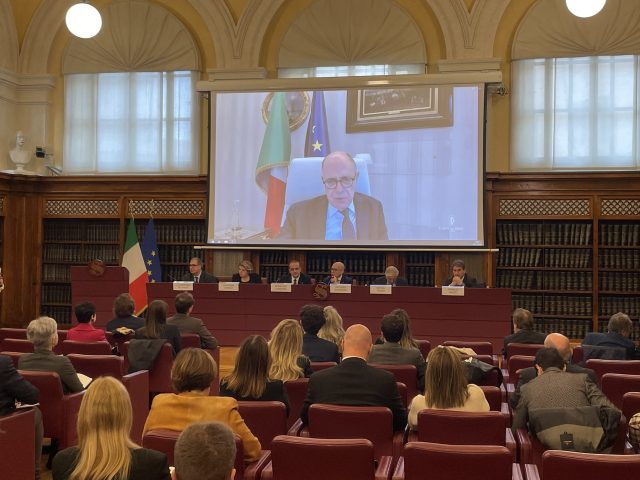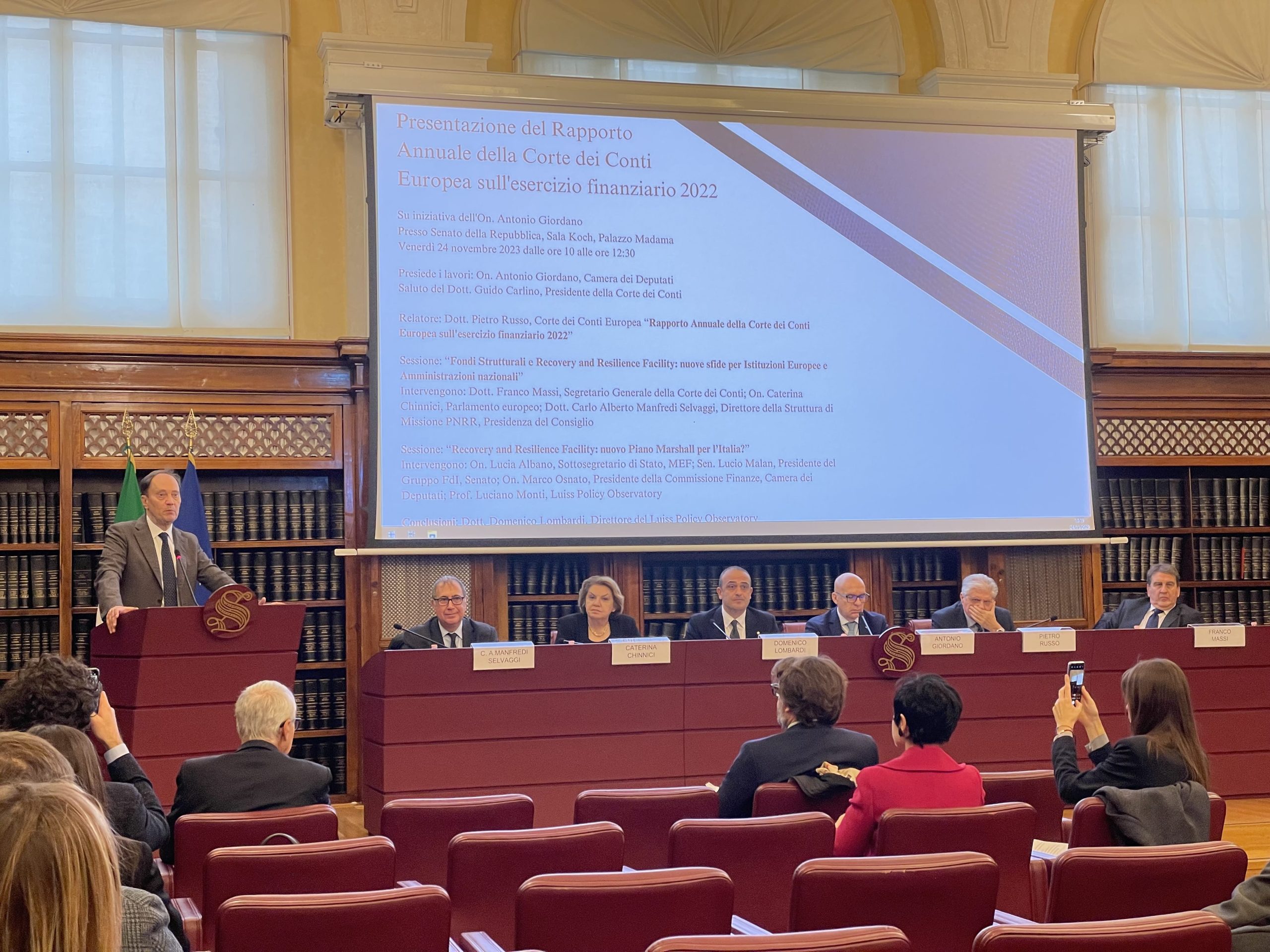
Opinions from the presentation of the 2022 Report of the European Court of Auditors.
The presentation of the annual report of the European Court of Auditors, relating to the 2022 financial year, was held on the morning of 24 November 2023 in Rome, in the Italian Senate Palace, chaired by the Secretary General of the ECR, MP Antonio Giordano (FdI).
Giordano introduced the meeting by summarizing the main prerogatives of the European Court of Auditors and recalling how it is an institution that has always increased its space in recent years. In his speech he focused great attention on the principle of subsidiarity, clearly engraved in the European treaties, noting how this is not yet finding its rightful place. “This principle – explains the Hon. Giordano – would configure that limit in which it is more appropriate for the national State to manage a certain business or regulation. The more the level of subsidiarity is raised, the more space for the European Union is reduced, and the more it is lowered the more the European Union tends towards legislative “overflow”, which increasingly undermines local realities.
At the opening, the Minister for Relations with Parliament Luca Ciriani (FdI, ECR) began with a warning of how the activity of the European Court of Auditors concretely shows the need of local authorities to guarantee the realization of large works within times in which they are valid for the community, with the protection from criminal people and speculators, who seek public resources to enrich themselves at the expense of the community.
The report was presented by Pietro Russo, magistrate of the European Court of Auditors, expressing various considerations. In particular, he began by focusing on cohesion funds which, despite representing approximately 40.4% of the entire EU budget, continue to show great complexity in the bureaucratic procedures for allocating these resources in each State. Over the years, Italy has always ranked among the last nations in terms of spending capacity, which is why the executive led by Giorgia Meloni, supported by the Minister for European Affairs Raffaele Fitto (FdI, ECR), immediately concentrated great efforts on trend reversal as early as 2023. In the exposition of the report, Dr. Russo took the opportunity to report some main concrete cases to provide an overview of the control activity that the Court is required to carry out. In this case, it was highlighted that in Greece they had detected the absence of implementing decrees that could provide the green light for the disbursement of the expected funds; or how in Spain some documents even referred to periods before the creation of their Recovery and Resilience Plan and could therefore not be used as a basis for the payment of the installment.
MEP Caterina Chinnici (FI, EPP), Vice-President of CONT (Committee on Budgetary Control), set out in her speech a series of challenges that must be addressed to fully manage the huge amount constituted by the sum of the structural and the Next generation EU.
First of all, the fundamental need to simplify procedures, also streamlining obligations, so that the error rate increasingly decreases, determined in the prevalence of cases by profound complexity. A proposal that had been formulated, for example, was the use of lump sum payments, but with the difficulty of following the financing processes with effective and constant controls. We must not forget that there is a strong risk that Member States will not seize the opportunities for shared management financing without the necessary streamlining: to ensure transparency in the management of funds without slowing down the financing machine, a solution can be thought of which provides for a single integrated monitoring system between Europe and national states.
It is essential, in any case, that European funds open up new avenues, given their weight in the European budget and therefore in the taxation required of citizens of European states: the Secretary General of the Court of Auditors Franco Massi underlines that a “good expense ” is the main insurance of maintaining the “democratic circle”. In this sense, it is certainly entrusted to the legislative power to decide the budget rules while the executive power “manages” the funds by setting the objectives that implement the government’s political programs, but the whole thing – underlines Massi – must meet very specific criteria of efficiency, effectiveness, cost-effectiveness, legitimacy, and timeliness. The variable of time, if we think about it, can even make a public investment useless and obsolete, however large it is.
Carlo Alberto Manfredi Selvaggi, Director of the PNRR Mission Structure, drew attention to the reasons that had given rise to the Next Generation EU, namely responding to the pandemic emergency. Only following the conflict between Russia and Ukraine was the entire part relating to RepowerEU added. Today’s situation is further different from that of 2020, but the key principle behind the projects has remained the same: not money to spend, but objectives to achieve. A paradigm shift that sees funds allocated on a performance-based parameter, according to which the objective is achieved first, and only then the money is received. Logic would dictate that if the objective is not reached then the financing is not triggered and therefore no money is wasted. On the one hand, this had a cost-effectiveness criterion, on the other it meant that more important works could not be included.
The President of the Finance Commission of the Chamber of Deputies, Hon. Marco Osnato (FdI, ECR) returned to the theme of simplification, declaring how it arises from the awareness that the final objectives must be clear, otherwise, the risk is of getting lost in calls that are not accessible and therefore in a distrust of economic availability; while Prof. Luciano Monti of the LUISS Policy Observatory underlined, returning to the criterion of timeliness, how the “risk” of not spending the funds well (or not at all) becomes instead an opportunity: if a member country, which be it Italy or anyone else, it demonstrates that it truly cares about achieving certain objectives, the PNRR becomes the key to implementing existing projects, sustainable in themselves because they are already connected to a project, making them a reality through European funds.
A necessity, the latter, also taken up and highlighted by the Undersecretary of the Ministry of Economy and Finance, Hon. Lucia Albano (FdI, ECR), who then outlined the more or less clear similarities between the PNRR and the Marshall Plan, a name borrowed even from the President of the European Commission Ursula von der Leyen herself.
The conclusions of the event were entrusted to Domenico Lombardi, Director of the LUISS Policy Observatory, according to whom one of the objectives of the meeting was to create a platform for dialogue between representatives of the Government and representatives of academic institutions and the accounting judiciary: a perfectly achieved objective. During the morning, much awareness emerged that Dr. Lombardi, an economist by training, expertly linked the concept of cost, not so much “accounting” as economic. There has been an awareness that irregularities – if not outright illegal acts – are sources of costs which, in addition to not being good for the system, have repercussions on society; that the “fear of making mistakes” on the part of the Public Administration leads to postponements which then produce further “costs” in terms of time to invest and financial availability of funds; and that it is necessary to build collaboration between the supervisory bodies and the Public Administrations so that they can concretely support all those local administrators, who perhaps have different backgrounds from the financial and accounting world.
The meeting between politics and institutions with fiscal and monetary competencies has therefore demonstrated the profound work to be done for theRRNP to have significant relevance in the development of Italy and Europe.




 Subscribe
Subscribe